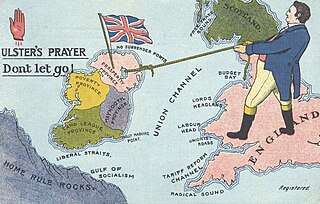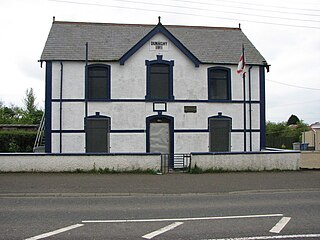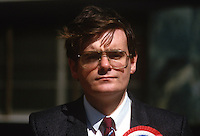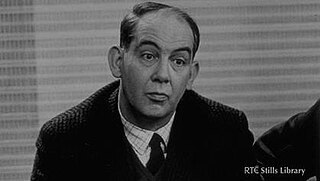Related Research Articles

The Loyalist Volunteer Force (LVF) was an Ulster loyalist paramilitary group in Northern Ireland. It was formed by Billy Wright in 1996 when he and his unit split from the Ulster Volunteer Force (UVF) after breaking its ceasefire. Most of its members came from the UVF's Mid-Ulster Brigade, which Wright had commanded. In a two-year period from August 1996, the LVF waged a paramilitary campaign in opposition to Irish republicanism and the Northern Ireland peace process. During this time it killed at least 14 people in gun and bomb attacks, almost all of them Catholic civilians killed at random. The LVF called off its campaign in August 1998 and decommissioned some of its weapons, but in the early 2000s a loyalist feud led to several killings. Since then, the LVF has been largely inactive, but its members are believed to have been involved in rioting and organized crime. In 2015, the security forces stated that the LVF "exists only as a criminal group" in Mid-Ulster and Antrim.

Ian Richard Kyle Paisley, Baron Bannside, was a loyalist politician and Protestant religious leader from Northern Ireland who served as leader of the Democratic Unionist Party (DUP) from 1971 to 2008 and First Minister of Northern Ireland from 2007 to 2008.

Unionism in Ireland is a political tradition that professes loyalty to the crown of the United Kingdom and to the union it represents with Great Britain. The overwhelming sentiment of Ireland's Protestant minority, unionism mobilised in the decades following Catholic Emancipation in 1829 to oppose restoration of a separate Irish parliament. Since Partition in 1921, as Ulster unionism its goal has been to retain Northern Ireland as a devolved region within the United Kingdom and to resist the prospect of an all-Ireland republic. Within the framework of the 1998 Belfast Agreement, which concluded three decades of political violence, unionists have shared office with Irish nationalists in a reformed Northern Ireland legislature and executive. In February 2024, after two years in which they refused cooperation in this consociational arrangement to protest what they perceived as an arranged post-Brexit drift toward an "all-island economy", unionists entered a Northern Ireland executive for the first time as a minority.
Joseph Alan Johnston Campbell was a Northern Irish Pentecostal pastor and Orangeman from Belfast. He founded and served as pastor and director of the Restored Open Bible Ministries in Northern Ireland. He was an author on Bible studies, a lecturer in the British Israelism movement and an advocate of white supremacy. Strongly opposed to Catholicism, Campbell published anti-Catholic literature and argued that the white Celto Anglo Saxon peoples of the world represent the lost tribes of the northern kingdom of Israel. He was known in Historicist circles due to his denial of the Westminster Confession of Faith, while Fundamentalist Protestants rejected his teachings as not being biblical.
Norman Porter was a loyalist politician in Northern Ireland.

Robert Jonathan Bradford was a Methodist Minister and a Vanguard Unionist and Ulster Unionist Member of Parliament for the Belfast South constituency in Northern Ireland until his assassination by the Provisional Irish Republican Army (IRA) on 14 November 1981.

The Independent Loyal Orange Institution is an offshoot of the Orange Institution, a Protestant fraternal organisation based in Northern Ireland. Initially pro-labour and supportive of tenant rights and land reform, over time it moved to a more conservative, unionist position.
The Ulster Protestant Volunteers was a loyalist and Reformed fundamentalist paramilitary group in Northern Ireland. They were active between 1966 and 1969 and closely linked to the Ulster Constitution Defence Committee (UCDC) and Ulster Volunteer Force (UVF), established by Ian Paisley and Noel Doherty in 1966.
The Ulster Constitution Defence Committee (UCDC) was established in Northern Ireland in April 1966 as the governing body of the loyalist Ulster Protestant Volunteers (UPV). It coordinated parades, counter demonstrations and paramilitary activities in order to maintain the status quo of the government, lead a campaign against the reforms of Terence O'Neill and stymie the civil rights movement.

The Ulster Workers' Council (UWC) strike was a general strike that took place in Northern Ireland between 15 May and 28 May 1974, during "the Troubles". The strike was called by unionists who were against the Sunningdale Agreement, which had been signed in December 1973. Specifically, the strikers opposed the sharing of political power with Irish nationalists, and the proposed role for the Republic of Ireland's government in running Northern Ireland.

George Seawright was a Scottish-born unionist politician in Northern Ireland and loyalist paramilitary in the Ulster Volunteer Force. He was assassinated by the Irish People's Liberation Organisation in 1987.
The Ulster Clubs was the name given to a network of Unionist organisations founded in Northern Ireland in November 1985. Emerging from an earlier group based in Portadown, the Ulster Clubs briefly mobilised wide support across Northern Ireland and sought to coordinate opposition to the development of closer relations between the governments of the United Kingdom and Ireland. The group's motto was "hope for the best and prepare for the worst".

The Loyal Orange Institution, commonly known as the Orange Order, is an international Protestant fraternal order based in Northern Ireland and primarily associated with Ulster Protestants. It also has lodges in England, Scotland and the Republic of Ireland, as well as in parts of the Commonwealth of Nations and the United States. The Orange Order was founded by Ulster Protestants in County Armagh in 1795, during a period of Protestant–Catholic sectarian conflict, as a fraternity sworn to maintain the Protestant Ascendancy in Ireland. The all-island Grand Orange Lodge of Ireland was established in 1798. Its name is a tribute to the Dutch-born Protestant king William of Orange, who defeated Catholic king James II in the Williamite–Jacobite War (1689–1691). The Order is best known for its yearly marches, the biggest of which are held on or around 12 July, a public holiday in Northern Ireland.

Ulster Resistance (UR), or the Ulster Resistance Movement (URM), is an Ulster loyalist paramilitary movement established by the Democratic Unionist Party (DUP) in Northern Ireland in November 1986 in opposition to the Anglo-Irish Agreement.
Ulster Protestant Action (UPA) was an Ulster loyalist political party and Protestant fundamentalist vigilante group in Northern Ireland that was founded in 1956 and re-formed as the Protestant Unionist Party in 1966.

William McCaughey was a member of the Royal Ulster Constabulary's Special Patrol Group and the illegal Ulster Volunteer Force's Glennane gang in the 1970s. He was imprisoned for 16 years for murder from 1980 to 1996. On his release he worked as a loyalist and Orange Order activist until his death in 2006.
The Evangelical Protestant Society (EPS) is a pressure group representing Christian evangelicalism in Northern Ireland. It was founded in Belfast in 1946 and opposes what it terms "liberalism and false ecumenism", "Romanism" and "Popery".

Major Ronald Terence Bunting (1924–1984) was a British Army officer and unionist political figure in Northern Ireland.
William Joseph Long OBE was a Unionist politician in Northern Ireland.
Richard Reid is a former Ulster unionist politician.
References
- ↑ "National Church Doctrine and Practice" [advertisement], The Times , 13 January 1944, p.6
- 1 2 3 4 5 Richard Lawrence Jordan, The Second Coming of Paisley: Militant Fundamentalism and Ulster Politics, p.222
- 1 2 "The Church Times on anti-Catholic rowdyism", The Living Church , 20 October 1946
- ↑ "Uproar in Church", The Guardian , 23 August 1945
- ↑ "Uproar in a London church", The Times , 23 September 1946
- ↑ "Bishop shouted down", The Guardian , 30 December 1946
- ↑ "New Protestant organisation", Irish Times , 26 August 1946
- ↑ Michael Farrell, Northern Ireland: The Orange State
- ↑ Clifford Smyth, Ian Paisley: Voice of Protestant Ulster, p.6
- ↑ "Televising of Roman Catholic mass", The Times , 11 March 1957
- ↑ "Scene over RC sermon at Abbey", Irish Times , 22 January 1966